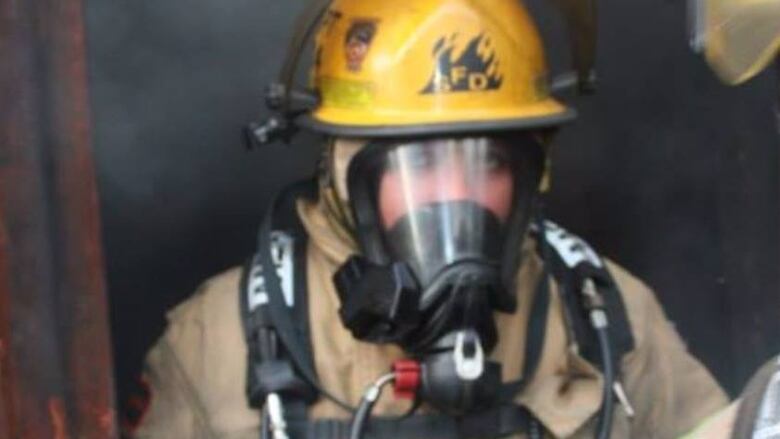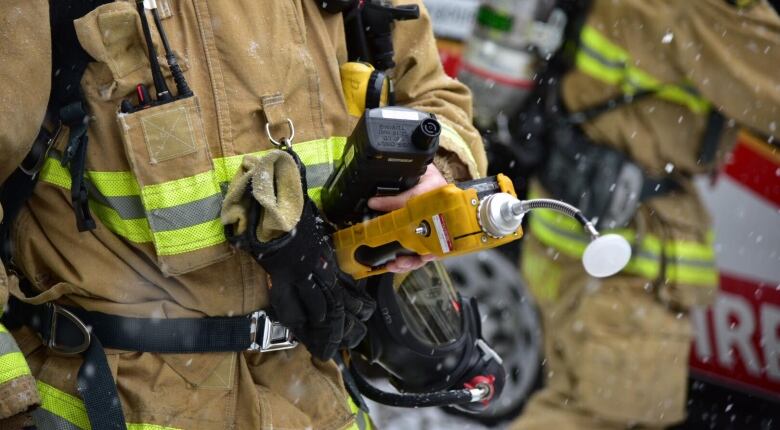Woman says breast cancer linked to 17 years as firefighter
Jo-Anne Colford said breast cancer linked to 17-year exposure to smoke, fumes

A New Brunswick woman believes the stage-four breast cancer she was diagnosed with in February is connected to her 17 years as a volunteer firefighter.
Jo-Anne Colford said the constant exposure to smoke and toxic fumes, coupled with alack of awareness of safer habits, likely "had a significant impact on my diagnosis."
The Stanley woman is callingfor compensation for firefighters who are diagnosed with breast cancer.
The province already compensates firefighters who develop 10 types of cancer, but breast cancer is not one of them, she said. But otherprovinces, such as Manitoba, cover it,she said.
"They started to recognize that this is also a risk for our firefighters, and not just the female firefighters," she said in an interview with Maritime Noon on Tuesday.
Existing legislation

In 2009, New Brunswick became the seventh province to enact presumptive legislation for professional fire fighters. The regulation covers 10 cancers, as well as heart injuries that occur within 24 hours of duty.
Fire fighters are covered for primary site brain, bladder, colorectal, esophageal, kidney, testicular and ureter cancer, in addition to leukemia, non-Hodgkins lymphoma and lung cancer in fire fighters who were non-smokers for at least 10 years prior to diagnosis.
Manitoba was the first province to enact this kind of legislation. It was also the first to recognize breast cancer as an occupational risk to female firefighters in 2010, linking it to exposure to toxic fumes and gases.
- Man. firefighters to get breast cancer coverage
- N.B. tables legislation to help firefighters with cancer
Colford said that firefighters today are more aware of the health risks they are exposed to. But 17 years ago, that was not the case. Firefighters would not always wear full protective equipment or properly look after their gear and breathing apparatus, she said.
Instead, the dirtier the gear was, "the prouder you were of the hard work you had done," she said. "We were really unaware of what risk we were putting ourselves through."
Coverage comes with high cost

She added that there really is no good reason why breast cancer should not be included on the list. It's already the second most common cancer in Atlantic Canadaafter lung cancer, she said.
"Honestly, I think it really comes down to dollars and cents for the province not to include this breast cancer as part of the cancer regulation," she said. "I think because breast cancer is so prevalent in our province, or even in Atlantic Canada, that they are concerned that it's going to cost them a lot of money."
Dan McCoy, president of the New Brunswick Association of Fire Chiefs, agrees with her. He is campaigning to get breast cancer on the list for compensation, and also wants to see melanoma and prostate cancer included.
But it boils down to cost, he said. Fire departments pay $690 for every firefighter they have, and every additional cancer covered under the legislation will increase the cost. For now, he said, the province only covers the ones most likely found to affect firefighters.
"It gets very costly depending on what cancers you want to add," he said, adding thatmunicipalities would foot the bill. And if that cost is exorbitant "how many firefighters can we have?" he said.
Fewer female firefighters than male
Colford stressed, however, that there are far fewer female than male firefighters in the province. According to the New Brunswick Association of Fire Chiefs, the total number of officers and firefighters in the province is 5,000.
About 500 of them are female, and across Canadaonly four per cent are women, she said.
While Colford is not expecting to get compensated for her own diagnosis, she wants to get more people involved in her campaign.
McCoy will discuss the issue at a convention of the province's fire chiefs, she said. She also has the support of the Capital District Firefighters' Association, and now hopes to get other associations in the province on board.
"I am going to be at the front lines and doing my very best to make sure that I am protecting the other female firefighters that are coming after me," she said.
With files from Maritime Noon












_(720p).jpg)


 OFFICIAL HD MUSIC VIDEO.jpg)
.jpg)



























































































